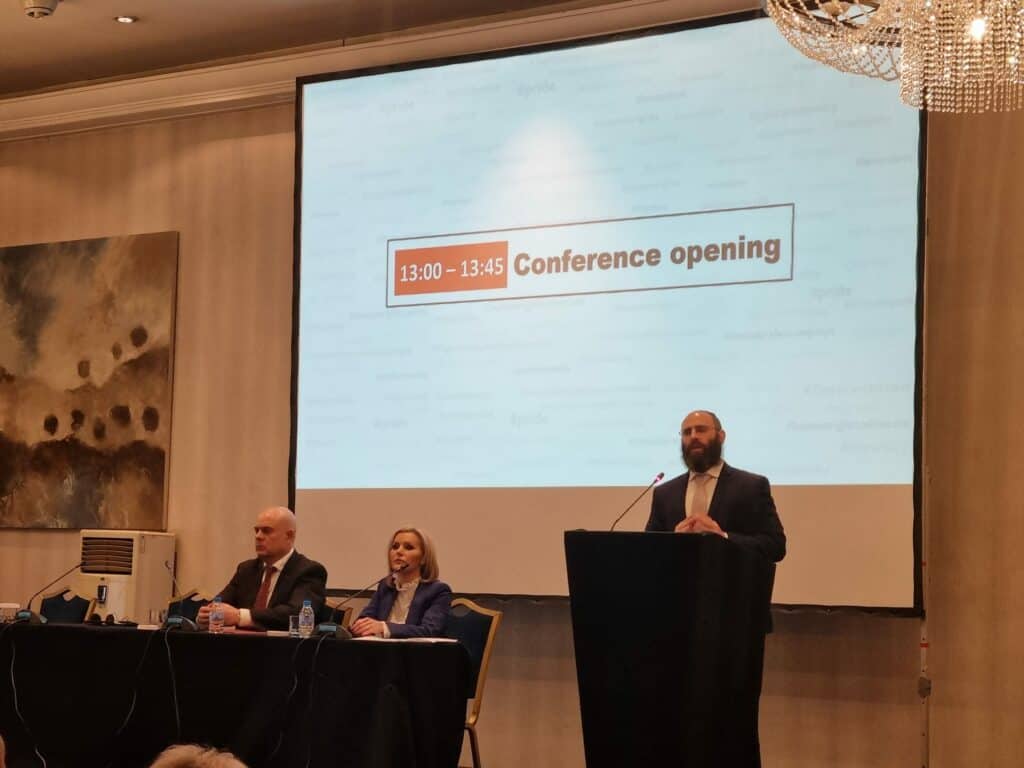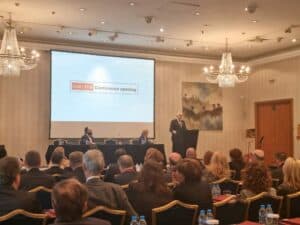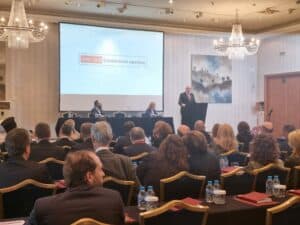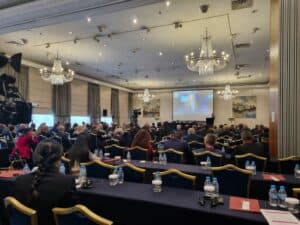Thank you to the European Parliament Working Group on Antisemitism for their open letter regarding the upcoming annualCarnival in Aalst, Belgium.


Thank you to the European Parliament Working Group on Antisemitism for their open letter regarding the upcoming annualCarnival in Aalst, Belgium.



The European Jewish Association is proud and delighted to welcome another organisation to our growing roster of partners and communities.
We have just concluded and signed a memorandum of understanding with The Jewish Community of Netherlands Israeelitische Hoofdsynagoge Arnhem (NIHS-Arnhem)
When two dynamic and active Jewish organisations get together and agree to work closely with one another, beautiful and important things flow from this. We look forward to working for the betterment of Dutch and European Jewry together.

Yesterday, on 3 October 2019, the European Jewish Association and our partners from the Action and Protection Foundation /Hungary/ have had a chance to further advance our ongoing promotion activities on the European Curriculum and Textbook Project against Antisemitism – this time in Prague, the beautiful capital of the Czech Republic.
At the meeting, where the EJA has been represented by Mihails Vorobeičiks-Mellers (Political Affairs Adviser) and the APF by Ferenc Olti (Board Member of the Hungarian Jewish Cultural Association) and Kálmán Szalai (Secretary), we have met with Jaroslav Faltýn (Director at the Department of Preschool, Basic, Basic Artistic and Special Education), Ladislav Bánovec (Director at the Department for International Relations) and Helena Čermáková (Department for International Relations) of the Ministry of Education, Youth and Sports of the Czech Republic.
The conversation, lasting close to 1.5 hours, has touched upon not only the project itself as well as the earlier Hungarian seven-year-ran program it is based on, but also the Czech school curriculum, educational programs and their development, existing system of teacher training, long-time knowledge and expertise exchange initiatives (including those related to the Czech Jewish community, its history and contributions towards beloved homeland) and many other topics.
Following the very informative descriptions provided by both sides and respective opinion exchanges, not only has it been agreed that further contacts on the initiative would be more than welcome and should be strongly encouraged, but also several concrete steps have been identified, which could be shortly implemented. These include designation of contact persons and execution of at least a few possible follow-up meetings (e.g., with Jewish leadership and experts as well as student associations, including those from abroad), which may take place already very soon.
We are most thankful to Mr. Faltýn, Mr. Bánovec, Ms. Čermáková and their colleagues at the Ministry for the reciprocated interest and for being such wonderful hosts, a most interesting and insightful conversation, and very much look forward to further contacts on the present initiative.


This week I spent a lot of time going to events marking the Shoah in Brussels. They were, rightly and fittingly, solemn occasions. But here’s the thing: at every event, I found my fellow Jews talking together, smiling, sharing stories and there was even the odd joke or two.
Even at this darkest of commemorations, there was life and a celebration of the deep bond between us that transcends the shared pain and history. And it stood in stark contrast to the others present who were sombre faced and bore the weight of history in a very different way.
It seemed to me that the reminder to stay positive and rejoice in your Judaism that I tried to leave you with last week needn’t have been said, as it was clearly and demonstrably in evidence.
Because when you think of it, and you delve a bit deeper into our faith, the reason becomes clear: Joy (Simcha), is our central artery, feeding our heart and mind and driving us forward.
Moses after leading us through trying times, through hardship, rebellion and our complaining, understood us well when he said that it is our capacity for joy that gives the Jewish People the strength to endure.
Explaining to a non-Jew our holidays often ends with the cliché “they tried to kill us, let’s eat”, but this throwaway comment masks a more fundamental truth.
Let’s pick a holiday out at random…Sukkot for instance.
On Sukkot we leave the security and comfort of our houses and live in a shack exposed to the wind, the cold and the rain. Yet we call it zeman simchatenu, “our season of joy”.
Try another: Purim.
On the face of it a deeply depressing story, and yet we overcame, and boy, do we celebrate!
Time and time again, throughout our texts, we are enjoined to celebrate life, to rejoice.
Now either we are a bunch of deeply weird people who seem to thrive on adversity, orsomething deeper is going on here. You don’t need to guess what side I’m going to lean on. But let’s dwell on the ‘weird’ idea for a minute.
The founder of the Chassidic movement was once asked: “Why is it that Chassidim burst into song and dance at the slightest provocation? Is this the behaviour of a healthy, sane individual?”
The Baal Shem Tov responded with a story about a deaf man coming across a group of townspeople dancing to a musician that he hadn’t seen, and he thought they had gone mad.
The point is, without the context, such expressions of joy can appear disconcerting or perplexing.
Our context runs deep. We are commanded to Love the Lord our G-d with all our heart and all our soul and all our might. Moses as we touched upon earlier put Joy at the heart of Judaism (even as he was reading out the curses), and our Mitzvot? Well, the concept of simcha shel mitzvah, the “joy of a mitzvah,” has always been part and parcel of Jewish teachings.
Rabbi Lord Sachs, as eloquent as always, once told a story that toward the end of his life, having been deaf for twenty years, Beethoven composed one of the greatest pieces of music ever written, his Ninth Symphony. It became the West’s first choral symphony. The words he set to music were Schiller’s Ode to Joy.
Now, Ode to Joy, as any Europhiles reading this will know, is the anthem for the European Union. And Rabbi Sachs story came to mind as I was looking at the European flag at one of the events.
Because looking around the room, looking at my fellow Jews smiling, living, rejoicing in their Judaism at this tragic commemoration, and contrasting it with the others present, underlined to me not only the context I was just talking about, but how each of us, each Jew, has, as Rabbi Sachs alluded to, their own ‘ode to Joy’ within them, an ode that to those who are deaf to it might indeed appear odd, but to us comes not as second nature, but instead as the primary essence of our being.
Rabbi Menachem Mendel of Lubavitch wrote that “The Baal Shem Tov wiped away tears from the Jewish people. He worked hard to ensure that every Jew would be happy simply because he is a Jew.”
There’s still a lot more work to be done on this by all of us, but looking around the room at those various events, it was clear to me that the joy of being a Jew remains the ‘perfect defeat’ of the Holocaust, and a reminder, if one were needed, of what a beautiful thing it is to be Jewish.
We must always continue to go out with Joy.

Such an event is being held for the first time in our country and it will be attended by Prosecutors General and supreme prosecutors from states of the European Union and the region, senior clerics of various religions, representatives of state institutions, non-governmental organizations, academic society, human rights defenders and civil activists. The main goal of the conference is to create a platform for the exchange of experience and good practices, which will help to effectively and timely counter xenophobic, anti-Semitic and discriminatory acts, as well as against the incitement and commitment of hate crimes.
The international conference will be opened by Prosecutor General of the Republic of Bulgaria Ivan Geshev. Welcome speech will be addressed to the participants by the Vice President of the Republic of Bulgaria Iliana Yotova, the Interim Minister of Justice Krum Zarkov, Rabbi Menachem Margolin, Chairman of the European Jewish Association and representatives of the executive and judicial authorities.
Video message to the participants will be addressed by Manfred Weber – Chairman of the EPP Group in the European Parliament, Ilhan Kyuchuk, MEP from the “Renew Europe” Group in the EP and co-chairman of the European Liberals, Adrian Vázquez Lazara – Chair of the Legal Affairs Committee in the EP.
At the invitation of the Prosecutor General Ivan Geshev, the Prosecutor General of Romania Gabriela Scutea, the Prosecutor General of Lithuania Nida Grunskiene, the Prosecutor General of Slovenia Drago Šketa, the Chief Prosecutor of the State of North Rhine Westphalia – Germany Markus Hartmann, the Deputy Republic Public Prosecutor of Serbia Tamara Mirovic, the Deputy Prosecutor General of Albania Thoma Jano, the Head of Odesa Regional Prosecutor’s Office – Ukraine Sergiy Kostenko, chief prosecutors from the Republic of Slovak, the Czech Republic, Latvia and Estonia, experts from Eurojust and the Council of Europe, the leadership of the Prosecutor’s Office of the Republic of Bulgaria, etc. will take part in the International Conference.
The international conference STOP HATE SPEECH will gather in one place clerics from four religions. Guests at the event will be Bishop Polycarp, Vicar of His Holiness the Bulgarian Patriarch and Metropolitan Neophyte of Sofia, Alexander Moshev- representative of the Apostolic Nuncio in our country, Grand Mufti Mustafa Hadji. The chief rabbi of the Netherlands, Benjamin Jacob is arriving for the forum in Sofia.
A lecturer at the event will be the photojournalist Marissa Roth, Pulitzer Prize-winner for coverage of the 1992 Los Angeles riots sparked by police brutality against a black biker.
An example of the increasing risk of hate crime these days, related to killing a defenseless person because of his ethnicity, will be presented by Keren Knoll. She is one of the heirs of Mireille Knoll, an 85-year-old French woman of Jewish descent who survived the Holocaust in World War II and was murdered in her Paris home in 2018 because of her ethnicity.
Within the framework of the two-day conference, a discussion will be held on protection of human rights and respect for ethnicity and gender and speakers on the topic will be representatives of the Bulgarian Helsinki Committee, the Bilitis Foundation, activists for the rights of the LGBT community, the Center for Inter-Ethnic Dialogue and tolerance “Amalipe” and others.
Representatives of the academic society will take part in the separate discussions, as Prof. Dr. Vili Lilkov will present a historical overview of the rescue of Bulgarian Jews during the Second World War, and Assoc. Prof. Simeon Groisman will present an analysis of the topic: “The religious – source and object of hatred in the age of “Online Crowds”. Among the participants of the International Conference are Assoc. Prof. Iva Pushkarova, Assoc. Prof. Rumyana Hristidi, Milena Kotseva, Director of the Directorate “Procedural Representation before the ECHR” in the Ministry of Justice, Yulia Dandolova, executive director of the organization of Jews in Bulgaria “Shalom” and others.
The program of the event is divided into three thematic panels:
“Countering Crimes Against Religions” with moderator Alexander Benjamin from the European Jewish Association; “Protecting the citizens’- rule of law – way to guarantee the fundamental human rights” with moderator Vladimir Nikolov – Chairman of the Association of Prosecutors in Bulgaria; “Crimes with a discriminatory motive – the needs of measures guaranteeing the rights of minority groups” with moderator Liliya Dragoeva, BILITIS FOUNDATION.
Nearly 70 media representatives are accredited for the event.




It’s a challenging time for Jewish communities in Europe. Anti-Semitism is on the rise as populism and the politics of the lowest common denominator are gaining traction. Our communities often need round the clock protection and our practices and customs such as keeping Kosher are under pressure from increasing political interference.
| Cookie | Duration | Description |
|---|---|---|
| cookielawinfo-checkbox-analytics | 11 months | This cookie is set by GDPR Cookie Consent plugin. The cookie is used to store the user consent for the cookies in the category "Analytics". |
| cookielawinfo-checkbox-functional | 11 months | The cookie is set by GDPR cookie consent to record the user consent for the cookies in the category "Functional". |
| cookielawinfo-checkbox-necessary | 11 months | This cookie is set by GDPR Cookie Consent plugin. The cookies is used to store the user consent for the cookies in the category "Necessary". |
| cookielawinfo-checkbox-others | 11 months | This cookie is set by GDPR Cookie Consent plugin. The cookie is used to store the user consent for the cookies in the category "Other. |
| cookielawinfo-checkbox-performance | 11 months | This cookie is set by GDPR Cookie Consent plugin. The cookie is used to store the user consent for the cookies in the category "Performance". |
| viewed_cookie_policy | 11 months | The cookie is set by the GDPR Cookie Consent plugin and is used to store whether or not user has consented to the use of cookies. It does not store any personal data. |